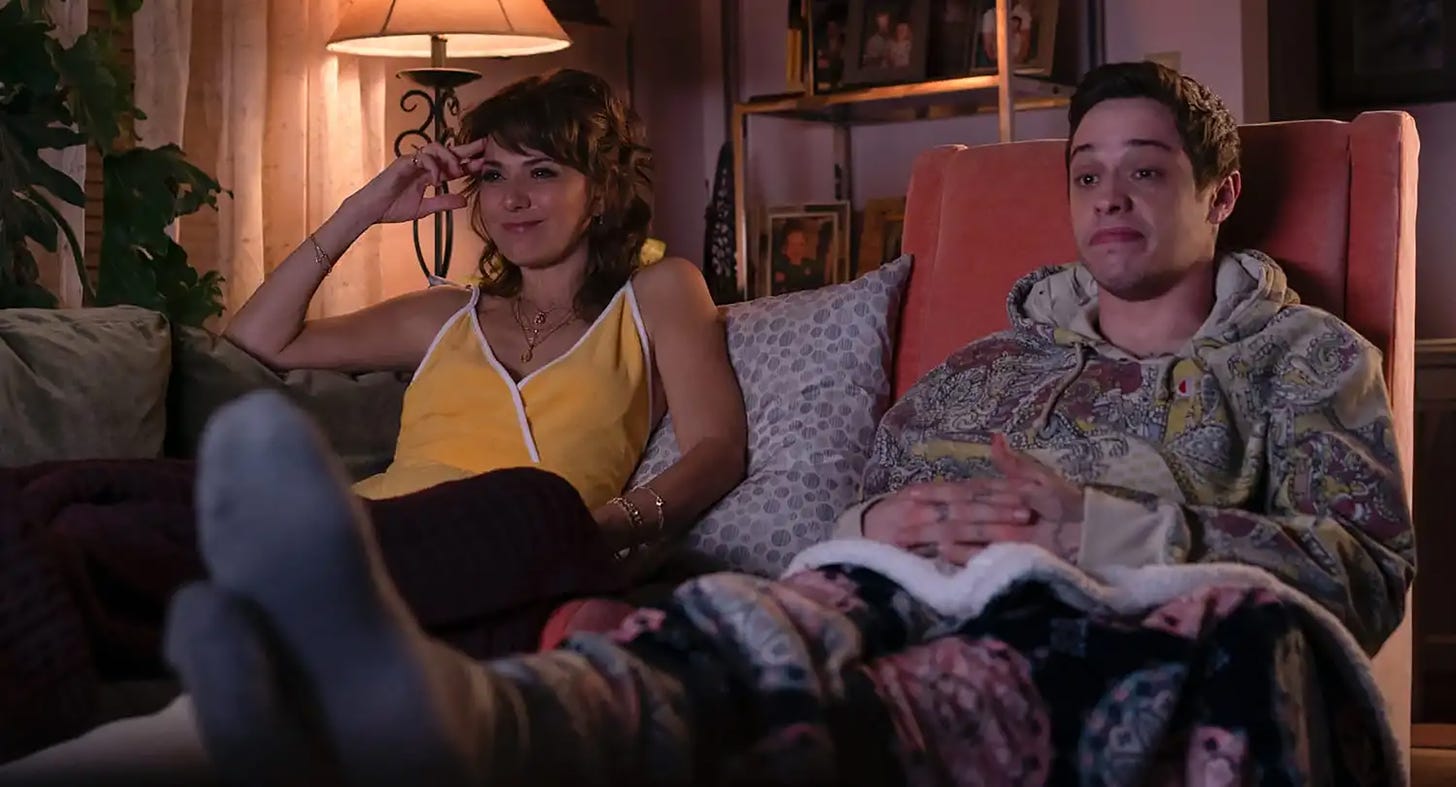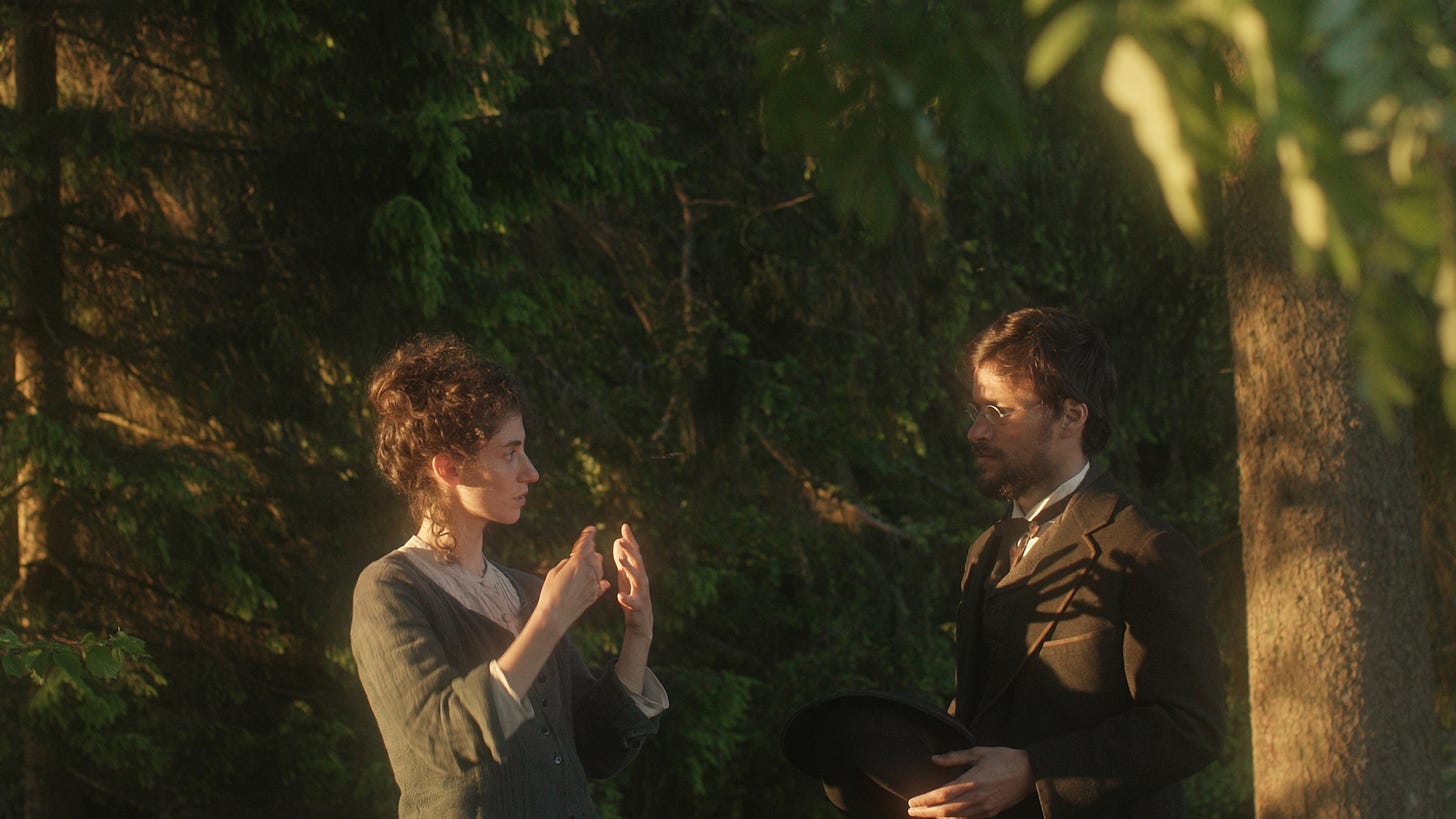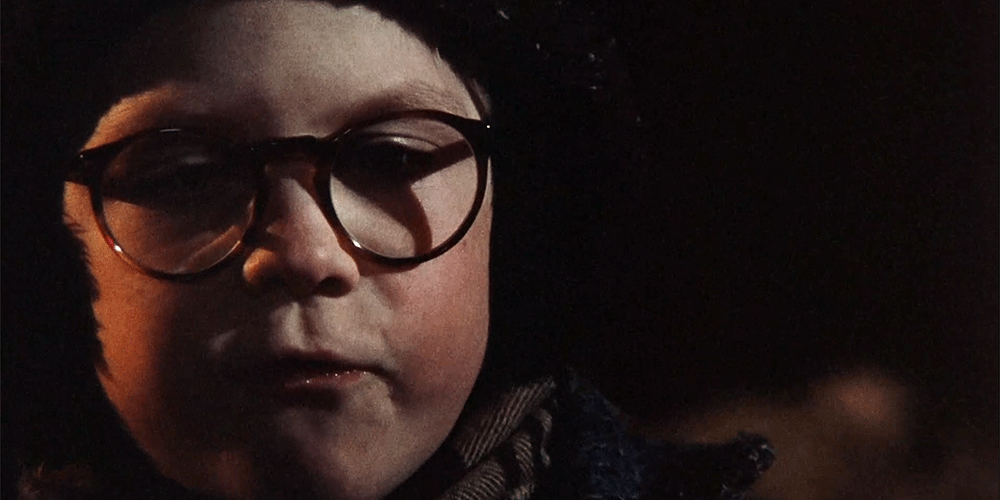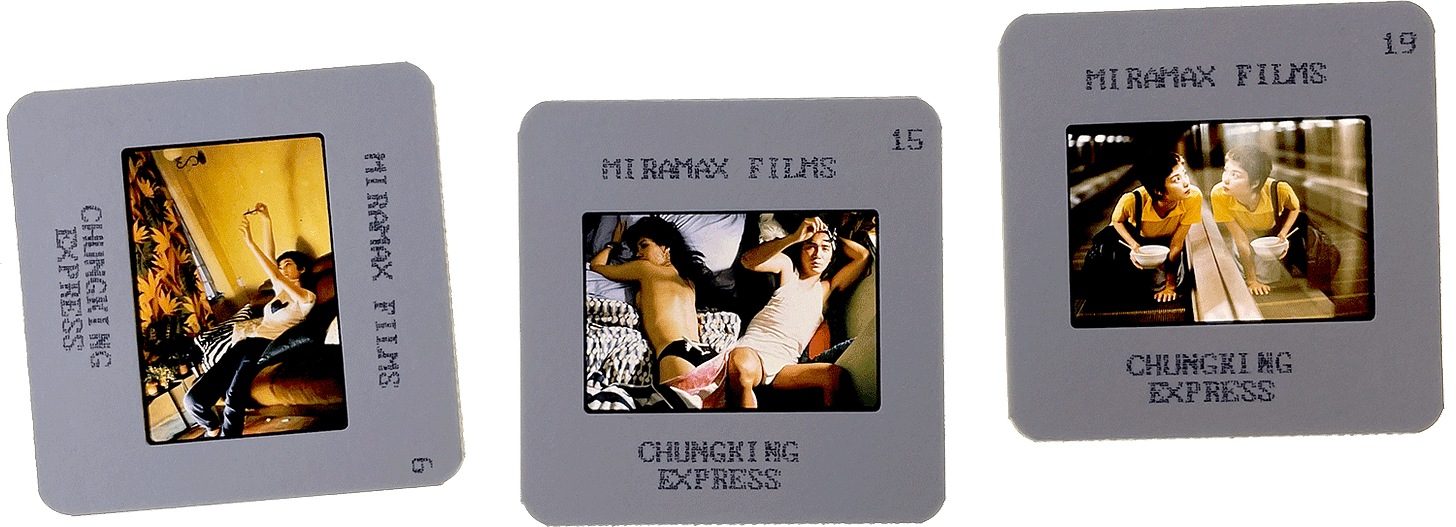It’s been a rainy first week of May here in Buffalo—perfect weather to stay inside to watch the Stanley Cup Playoffs and some movies. I also got to catch Pete Davidson’s new Peacock show BUPKIS (which in turn meant I had to finally watch THE KING OF STATEN ISLAND), so keeping busy wasn’t a problem.
I’ve also decided to try sticking with MoviePass. I figured I can commit to two films a month. The trouble now is catching up so I don’t lose any more credits, hence going to THE COVENANT last week, POLITE SOCIETY this week, and maybe SHOWING UP next week? I’d like to get GUARDIANS OF THE GALAXY VOL. 3 out of the way, but I still haven’t seen QUANTUMANIA yet (doesn’t hit Disney+ until 5/17). So, probably pushing that further into the future (not like it’s going to be leaving theaters anytime soon).
A new month also means a new Posterized column at The Film Stage: LINK.
What I Watched:
BUPKIS: Season 1
(now streaming on Peacock)
I’m glad I decided to finally catch-up to THE KING OF STATEN ISLAND before watching Pete Davidson’s BUPKIS because it really messed with my expectations. The Judd Apatow film is a semi-autobiographical account of the comedian’s life, but it takes a heartfelt look at grief and arrested development while fictionalizing where its alt-reality Davidson’s life could have gone. I don’t therefore think it was wrong to assume his latest reimagining of himself would be the same. Perhaps that’s even the hope since what he delivers is very different. There’s still a bit of heart in every episode of this first season, but the major takeaway is the unhinged combination of absurd comedy and gonzo cameos. Davidson is conducting a roast on himself and the industry. He’s roasting his family, identity, and celebrity with zero restraint, taking us through the disturbing rabbit hole of how nonsensical it is to always have your private life be so publicly judged.
The persona on-screen is present-day Pete Davidson. Everyone knows who he is. He goes everywhere with his entourage. And Hollywood is locking him into that exploitative position of wanting to sell their product with his name but not wanting to deal with the inevitably unwholesome image the media will be presenting during his tenure of employment. He’s living on Staten Island with his mother Amy (Edie Falco)—or, as he likes to describe it, she’s living with him since he pays the mortgage. Hitting comedy clubs and traveling the country doing gigs that will hopefully advance his acting career. Sometimes he’s being forced by his agent (Chris O’Donnell) to play nice and perform a kid’s birthday party to get in with an A-lister. Sometimes he’s trying to get away from it all by hanging with his grandfather (Joe Pesci’s Joe) to acquire some sage, profanity-laced wisdom.
The format is skit-like in construction. There are constant callbacks to previous events and consistent character arcs, but each episode possesses its own unique setting and/or purpose. A nostalgia-fueled trip down memory lane with flashbacks to Pete’s aunt’s wedding (to Bobby Cannavale). A high-octane adventure in Florida to earn an audition with the FAST AND FURIOUS gang that turns into a madcap parody of the franchise courtesy of a cartoonishly “crispy” Simon Rex. There’s an amusement park, Canadian film set, and even a rehab clinic, each with its insane share of unforgettable faces playing kooky side players (Method Man is my favorite) or extreme caricatures of themselves (Sebastian Stan and Ray Romano are a lot of fun). Add a bunch of people from THE KING OF STATEN ISLAND, a recurring Brad Garrett as Joe’s best friend, and even Art the Clown to discover you really can’t anticipate just how off-the-wall things might get.
In the end, though, it’s also about growth. Not as much as the Apatow film, but enough. Outside that goal, Davidson and co-writers Judah Miller and Dave Sirus are giving themselves a lot more leeway to leave audiences laughing by any means necessary. Nothing is out-of-bounds. Semen. Prostitutes. Bazookas. Dave Attell. Whatever random thing they can inject into the script to liven things up regardless of whether its success is because of how well it fits the story or how out-of-place it proves. That means Falco and Pesci are allowed to go crazy at times too. Yes, they’re the “voices of reason” in this circus, but they’re also the two who helped raise Pete to be who he is today. Because they’re fallible and prone to going overboard too, he can be himself without worrying about the consequences. The real saints are his sister (Oona Roche) and on/off girlfriend (Chase Sui Wonders). They’re the ones who are difficult to listen to because he’s both a screw-up who can’t and truly desperate to never disappoint them.
BUPKIS is a tight eight episodes with an extremely shameless Davidson leading the way. The family stuff works well because of Falco and Pesci’s help, but I’ll admit I was much more invested in the “inside baseball” stuff like the psychological effect of constantly seeing people talk bad about you on the internet, the chaos of loved ones hearing unsubstantiated reports that you died, and a frank conversation between friends (John Mulaney) about drug abuse and personal demons that can maintain seriousness despite its wink of artifice. And since it’s a television show with less financial risk than a Hollywood theatrical feature, it doesn’t need a happy ending. It can just exist as the messy exploits of a well-meaning but chronically helpless man-child who simply doesn’t have the attention span to steer the ship on-course. Davidson is giving us what we already believe and embellishing it so far beyond plausibility that we must question whether any of it was ever really true.
- 8/10
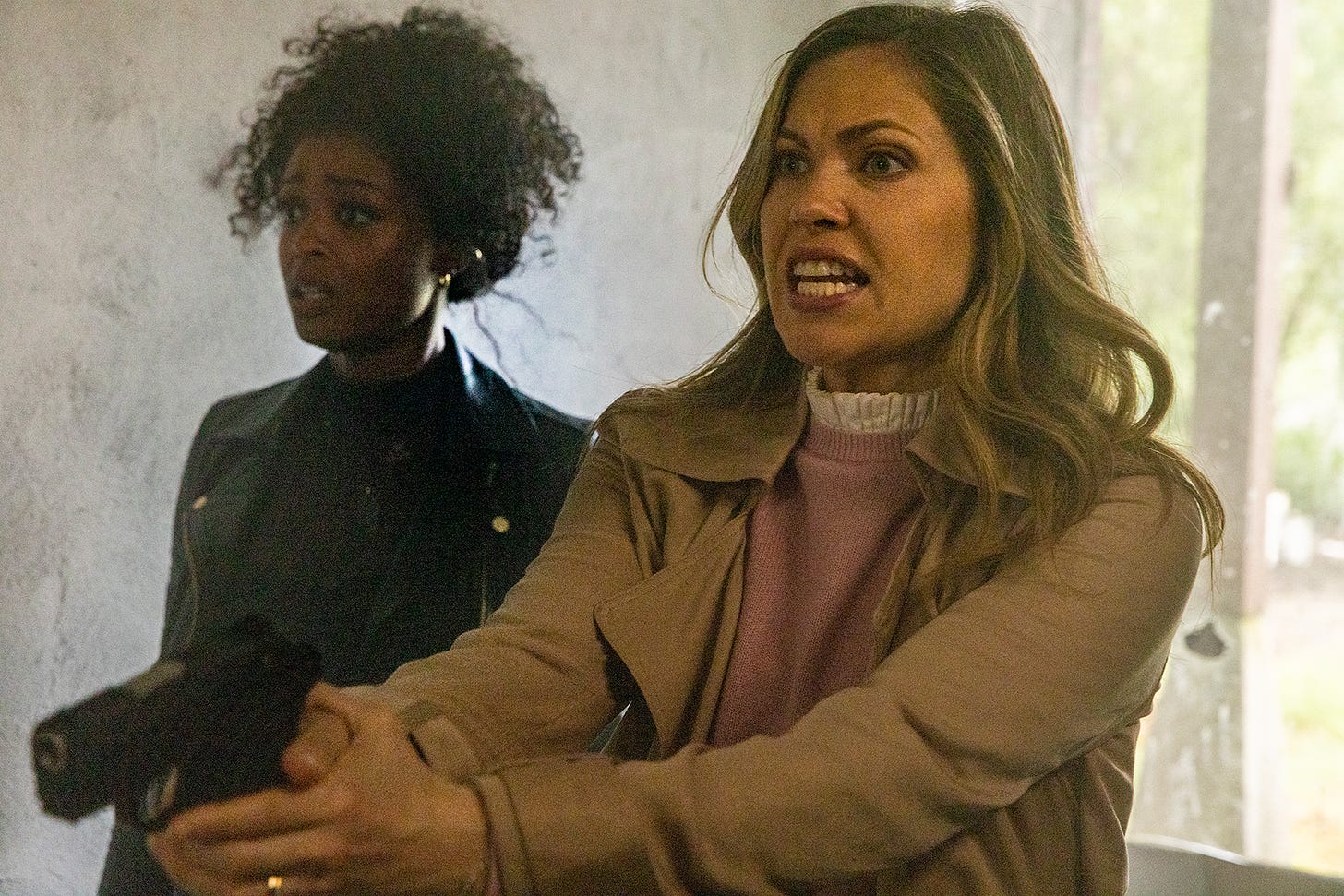
DOUBLE LIFE
(now in limited release and on Digital HD; VOD on May 19)
When your film is about the wife (Pascale Hutton’s Sharon) and mistress (Javicia Leslie’s Jo) of a high-powered attorney who team up to uncover the truth of his murder, you better make him a saint (besides the adultery, of course). Director Martin Wood and screenwriters Michael Hurst and Chris Sivertson may go a bit overboard in that respect with DOUBLE LIFE, but you can’t necessarily blame them for trying to make the odd couple pairing at the center of the film as airtight as possible. Because Sharon should hate Jo. And Jo should hate Sharon’s husband (Niall Matter’s Mark) since he never told her he was married. Add the fact that teaming up to find answers seems to get them into dire straits with hitmen, shady government officials, and potentially dirty cops and maybe forgetting Mark ever existed is their best option.
While saying the film feels like an episode of a television drama generally connotes low budgets and subpar acting, I say it here because of the ways in which everything hinges on sob stories. Overcoming tragedy becomes these women’s identities to the point where Sharon and Mark’s shared loss can be used as an excuse for why he stepped out on their marriage (the script all but lets her blame herself by relating tales of grief pushing him away). And why does Sharon start to trust Jo? It’s not because she believes her when told she didn’t know Mark was married. It’s because Jo proves herself to be a loving daughter (two times over) under trying circumstances. Someone smarter than me could probably pick apart the ways in which these women are written and how Mark is always (mostly) absolved being a product of the filmmakers all being men.
If you get past those ham-fisted machinations, however, the result isn’t that bad. It still feels like an expanded CBS procedural, but overwrought manipulations don’t automatically erase effectiveness. By not letting Sharon and Jo trust anyone but the other—no matter how strange that might be considering their circumstances—their dynamic is allowed to be a nice mix of understandable friction and involuntary empathy. While the police (Carmen Moore’s Detective Traxler) drag their feet and Mark’s colleagues (Vincent Gale’s Larry and Aaron Douglas’ DA Sheldon Roberts) harbor secrets and duplicity, Sharon and Jo are following leads. Doing so means crossing into an underworld they’re surprisingly prepared to combat (thanks to Jo’s “Mossad or something” ex-boyfriend) while ruffling feathers and, perhaps, breaking the case wide open.
Hutton and Leslie (I was a fan of her BATWOMAN) have an authentically complicated rapport that makes it easy to invest in their joint journey. There’s enough justifiable animosity to keep it from being unrealistic and honest compassion to realize the person that anger should be targeting is Mark. Does it all feel convenient as a result? Sure. But there are enough loose threads (why isn’t John Cassini’s infamous Louis Strand leaving a pile of bodies in his wake) to keep us guessing even if the suspect pool is always the same group of three. Which ones are actually who they say they are and which are playing the game? Since Sharon and Jo are the only ones without any involvement, they can be the ones with the objectivity and reckless desire to reveal every skeleton possible. The stakes never rise high enough to wow the audience, but it’s a decent option for escapist melodrama on a rainy day of channel surfing.
- 6/10
THE KING OF STATEN ISLAND
(streaming via Freevee and available on VOD/Digital HD)
I’m surprised how much I enjoyed THE KING OF STATEN ISLAND. I like Judd Apatow films and find Pete Davidson funny, but its semi-autobiography pushing well past a two-hour runtime seemed like the worst tendencies of both being married together. And regardless of whether that marriage succeeded, this is still true. It’s somewhat bloated (repetitive, but never boring) and BUPKIS coming out this week as another semi-autobiography does make you wonder if Davidson has anything else to offer creatively. But maybe that stuff is also part of its charm. It doesn’t feel polished or fake. It lets its characters be messy so that we can simultaneously laugh at them and understand their pain. And for all the early hijinks, the second half proves an effectively emotional evolution.
Scott (Pete Davidson) has been able to coast by as a freeloader under his widowed mother’s (Marisa Tomei’s Margie) roof this long (his father died battling a fire when he was seven) because his younger sister Claire (Maude Apatow) was there as a buffer. As long as Mom put her upbringing at the forefront, Scott could ride the wave of free meals and no rent. So, when she goes off to college, the dynamic can’t help but shift. It doesn’t necessarily have to if he got his head far enough out of his backside to realize that companionship and empathy would go a long way towards continuing this domestic arrangement, but we’re talking about a selfish, self-pitying twenty-four-year-old stoner who’s been “finding himself” for a decade. Scott is therefore an adult. Margie doesn’t need to cater to his whims. She can date. Redecorate. Finally kick him out of the nest.
It’s not the smoothest of transitions, but one that needs to happen if either of them are going to attempt finding happiness in a present and future that shouldn’t constantly be beholden to their shared past of loss. Margie starts dating Ray (Bill Burr), a firefighter like her first husband. Scott’s best friend and maybe girlfriend Kelsey (Bel Powley) wants to get her life together and needs him to be serious about whether he wants to be part of it. And his friends (Ricky Velez, Lou Wilson, and Moises Arias) decide pivoting from nickel and dime drug dealing to robbery is “constructive”. Life has thrown Scott into the deep-end and his attempt at treading water is to intentionally sabotage those around him so everything can return to the tragic status quo. For the first time ever, though, they all decline.
The film admittedly takes way too long to set all that up, but it’s all entertaining enough to understand why Apatow left it all in (choppy editing or not). We’re talking a full hour to get to the breaking point we all know is coming because this whole exercise is wasted if it doesn’t. That’s when things get good. When Scott’s safety net is stolen away and he must choose his actions and words more carefully. It’s not a coincidence then that his friends disappear from the story. Or that Kelsey and Margie do too (albeit because they made is so he disappeared from theirs). This is about Scott coming to grips with his issues. Accepting and acknowledging them as more than a crutch and excuse. It leads to some really wonderful moments (I love the scenes with him and Ray’s kids) while never losing the acerbic bite of Davidson’s delivery.
- 7/10

POLITE SOCIETY
(now in theaters)
It was an unwritten pact between sisters Lina (Ritu Arya) and Ria (Priya Kansara) that they would fight back against the stereotypical demand of Pakistani parents the world over to escape the pressures of becoming doctors or housewives. Lina would pursue her passion in the arts. Ria would train to achieve her dream of becoming a stunt woman. They would live happily ever after doing what they wanted, proving everyone wrong in the process. And they hold strong to that desire even if their parents (Shobu Kapoor and Jeff Mirza) begrudgingly grant the freedom to do so under an assumption that they’ll fail and pivot to more traditional futures anyway. They might be correct too as an existential crisis hits Lina and drives her to slash her canvases, quit school, and return home with a hopeless sense of failure.
The question writer/director Nida Manzoor poses in the aftermath is whether Ria’s intensity will fall prey to that same futility or if it might prove powerful enough to sustain her and Lina both. POLITE SOCIETY therefore moves into glimpses of their unshakeable bond of friendship and cheerleading. Ria keeps trying to land a spin kick on-camera and keeps falling with a thud each time. But no matter how depressed Lina feels, her little sister always drags her out of bed (literally) to hold the phone and deliver earnest platitudes straight from the heart. Getting her outside and active seems to be working too. Maybe Lina won’t suddenly re-enroll in school, but she’s starting to smile again and perhaps get inspired to create when the richest Pakistanis in town (Nimra Bucha’s Raheela and Akshay Khanna as her son Salim) invite them over to celebrate Eid.
What follows is obvious as love soon fills the void left by Lina’s waning creativity. Or is it something else since Lina and Salim aren’t an evident match? Has Mr. Perfect really picked the neighborhood Bad Girl? Has Lina always been a cardigan-wearing prospective wife and mother ready to uproot herself and move to Singapore? Well, despite both parties’ parents buying it, Ria smells something fishy. Maybe it’s just her idealism. Maybe Ria can’t cope with the fact Lina could toss aside their shared dream so quickly after one bump in the road (rendering her own a fantasy). Or maybe she never knew her sister like she thought. Either way, Ria (with help from Seraphina Beh and Ella Bruccoleri as her BFFs Clara and Alba) seeks to sabotage the inevitable nuptials with a series of hilariously misbegotten schemes that drives a wedge between the sisters they may never repair.
That would be enough for most filmmakers to craft a heartfelt familial dramedy, but Manzoor sees the potential for more. With Ria’s penchant to embellish every verbal and physical skirmish (she’s always left bloodied and bruised in the moment, but rarely afterwards) and a left-field plot reveal that’s straight out of a Bond villain handbook, this ride has only begun. The action leaves a lot to be desired (it’s mostly running with limbs flailing through a barrage of edits), but there are a couple good sparring sessions that push us through (Ria against Raheela and Ria against Shona Babayemi’s “school bully” Kovacs shine). It’s the style that stands out instead—dialogue, chapter headings, expertly awkward comedic timing. Add the authentic love shared by Kansara and Arya and it’s tough not to come aboard for a madcap adventure that cements Manzoor’s talent as someone worth following.
- 7/10
UNREST [Unrueh]
(now in limited release)
First things first: Cyril Schäublin’s UNREST is a gorgeous film. About half the runtime consists of static setups from a distance with characters conversing in the corners of the frame or moving in and out with expert blocking. Much of what remains is a normal view of those same characters engaging in their day to activities (whether photographers taking and selling portraits for 20 centimes, men and women adorned with loupes to meticulously assemble Swiss pocket watches, or supervisors timing their progress and managers looking for matches to light their cigarettes) or close-up documentation of the technology and systems being used. The production design is impeccable, the acting naturalistic in its often-emotionless silences as the wealthy wryly smile with confusion and the workers glare with frustrated intent.
The closest thing to a story is that of cartographer Pyotr Kropotkin (Alexei Evstratov) making his way to Switzerland to embed himself in its blossoming anarchist movement circa 1870 and draw a map beholden to their localizations rather than the desires of strong-arming municipalities. Everything opens with a quartet of women remembering him—an introduction to the time and his motivations before transporting us to the factory town where he’s found himself. That’s when he meets Josephine Gräbli (Clara Gostynski), one of many women putting the so-called “unrest wheels” together so another area of the business can attach them to the rest of the clocks. She’s a full-blown anarchist, telling co-workers to slow down and stop adhering to their employer’s high demands. The pair will eventually journey out into the woods together, but Pyotr and Josephine are really just two of the many faces we meet on-screen.
And that’s fine since the film works best as a period-specific vibe. Anarchists covertly slipping propaganda into the pockets of the aristocracy in the form of matchbooks. The genial but powerless security force asking people to not walk in front of the new photography being taken of the factory (even though each shot lasts only twenty seconds). There’s an election. Tax evaders. Lotteries. Talk of a battle reenactment and how one’s need to relive such violence at the expense of taxpayer dollars shows more weakness than strength. Telegraph exchanges. It’s a moment of time where new technology becomes prevalent both to get employers thinking about greater profits and employees thinking about higher wages and discretionary income. Because these new tools (camera, telegraph, etc.) should be about leveling the playing field, not widening the chasm. But since these same political issues remain at play today, capitalistic greed continues to prevail.
- 7/10

WHAT’S LOVE GOT TO DO WITH IT?
(now in theaters)
Not to ruin a joke in the movie, but it’s quite fitting that the vapid finance bros who commission the in-film documentary that Zoe Stevenson (Lily James) is making would eventually realize they forgot a “check” while discussing how well the project fit their “woke” profitability rubric. Yes, the topic of arranged marriages by way of a British-Pakistani groom (Shazad Latif’s Kazim) and the Pakistani bride their parents matched (Sajal Ali’s Maymouna) does check the “ethnic” box. And yes, Zoe being a woman does check the “female director” box. But what about the fact that she’s white? These two guys are so transparent themselves that they completely forgot the lens holds as much importance as the optics. That’s why WHAT’S LOVE GOT TO DO WITH IT? made sure to check all three with British screenwriter Jemima Khan (who lived and loved Pakistan when married to her former husband) and Pakistani director Shekhar Kapur (of ELIZABETH fame).
These meta layers and parallels are a big part of the film’s success, allowing it to both have its heart (as far as depicting love, culture, and a humanistic glimpse at a nation too often rejected as a terrorist hotbed) and its mind (where self-deprecating humor about the industry, “modern” romance, and appropriation are concerned) in the right place. Because it’s easy to get confused about the world we live in when so many overlaps and diversions create insular bubbles. Zoe has always seen Kaz as a Brit, forgetting everything he faces as a person of color in a Europe that’s quick to label him “British-born” instead. And Kaz has always seen Zoe as a welcome, if bad, influence on who he can strive to be outside the confines of his conservative Muslim family, but nothing more. He’s seen what happened when his older sister chose a non-Muslim husband. She was disowned. The only way to therefore ensure that everyone is happy when it comes to his desire to start a family is by letting his parents (Shabana Azmi’s Aisha and Jeff Mirza’s Zahid) choose for him.
So, the narrative progresses simultaneously as an education for the audience in how voluntarily arranged (not forced) marriages unfold in the twentieth century and a rom-com that never shies from the fact Zoe and Kaz have an unrequited, figuratively forbidden chemistry that increases the closer his nuptials get. She’s there for every moment of the lead-up as director of a film about his life—desperate to continuously make certain that he’s making the right decision without saying how she feels (if she even truly knows yet) while he watches as she continuously dates horrible men without being able to risk losing his family by admitting the love for her that he does know exists. And since we can be confident it will eventually all be said aloud, it doesn’t need to be a distraction. Khan and Kapur can let it linger in the background as a major through line while focusing on everything else in an honest and authentic way. The topic of arranged marriages isn’t just their gimmicky cupid’s arrow. Its inclusion matters.
So too does Maymouna’s part in this ordeal. And the suffering of Kaz’s family since the fracture between his sister and grandmother demands its complexity not be dismissed as some fear-mongered example of Islamic rigidity. Even Emma Thompson as Zoe’s mother and Khan family’s decades-long neighbor needs room to be more than just the benignly insensitive comic relief (adoring Pakistani culture while still backhandedly expressing why via ingrained whiteness). By allowing all these disparate characters to be one giant unconventional “family,” they can better express and repress their fears and desires. We can learn why someone like Kaz would agree to the arrangement sans judgement and recognize that it still might not be the right solution for him. Or for Maymouna. Or for Zoe once her mother begins “arranging” a blind date for her based on stability and more checked boxes that forget the bigger picture. Khan and Kapur are destigmatizing without overtly championing because, in the end, love is all that matters either way.
- 7/10
YOU CAN LIVE FOREVER
(now in limited release and on VOD)
Why live your entire life under a promise of paradise when you can live in one now? It’s the question that always sticks out for me regarding the topic of religion. I’m not talking about morality either. You can be moral and happy. Not living for some wish of eternal life doesn’t mean you become a murderer—no matter what those in power within every respective religion might say to the contrary. I’m talking about living with hate in your heart because of the rigidity of words in a book or, worse yet, malicious interpretations of those words. Because that and ignorance ultimately drive the insular natures of these organizations. To say that God loves all His children in one breath while excommunicating someone who has pure faith because of their sexual orientation in the next. The hypocrisy is so profound that none of them can breathe without suffering. They make their pain “a test” so they don’t ever look close enough to realize it’s a lie.
While those thoughts came to me as a result of watching Sarah Watts and Mark Slutsky’s YOU CAN LIVE FOREVER, they do not mean the film shares the same sentiment. This isn’t some diatribe against Jehovah’s Witnesses. It’s merely a complex look at the duality of faith and identity. Because if Marike (June Laporte) was given the opportunity to stay in the church and be a lesbian, she would. That’s how strong her belief in Jehovah is. Baptism is literally depicted as her kink here. She’ll follow his teachings. She’ll fulfill her father’s chores. And she’ll pretend that her mother—disfellowshipped and forbidden from speaking to anyone from the congregation—is dead. That’s how earnestly serious the religion is treated in Marike’s mind because it’s the very essence of life for those entrenched in its world. As a lesbian raised within it herself, however, Watts must also show that it always comes down to choice rather than compromise. Loving Jehovah and a woman wasn’t allowed for her. Faith is conditional.
That’s why this story focuses on Jaime (Anwen O'Driscoll) instead. If Marike was the subject, the script would be forced to take a more hardlined stance one way or the other. By turning our sight to Jaime, we can view the struggle from the outside. We can appreciate the anguish and accept a bit more ambiguity when it comes to a conclusion that has the potential of undoing the confused actions of a teenager imprisoned by her own devotion. Because Jaime isn’t a believer. She’s merely a niece sent off to live with her aunt (Liane Balaban’s Beth) and uncle (Antoine Yared’s JF) who are believers while her mother grieves the loss of her father. This is supposed to simply be a few months away in a boring town with nights spent listening to boring sermons. Beth has no intention of converting her and Jaime has no intention of staying. A blossoming, forbidden romance with Marike couldn’t have been anticipated.
Watts and Slutsky do a very good job balancing their themes since this isn’t your usual coming-of-age film. They must treat the Jehovah community, homosexuality, and Marike’s tug-of-war to find a way through both with equal respect. Sure, they poke fun at the former with Jaime’s new outsider friend Nathan (Hasani Freeman), but it’s never mean-spirited. And, yes, they don’t shy away from showing how intolerant the Jehovah’s Witnesses are towards homosexuality, but do sprinkle in some welcome nuance insofar as not making it fully black and white for everyone. There’s a wonderful exchange towards the end where Beth talks about how kids Jaime’s age can “get confused” that intentionally speaks on multiple levels since she isn’t as inflexible as Marike’s family. These girls are therefore able to live in the gray areas of their lives even if external forces are pulling them apart. Choices must be made, but they can also be reversed.
- 7/10
Cinematic F-Bombs:
I still can’t embed any tweets (which, honestly, isn’t a bad thing since they wouldn’t post smooth anyway) thanks to Musk, but figure I can at least list the new entries to the site made each week.
This week sees A CHRISTMAS STORY (1983), CLOCKWATCHERS (1998), GHOSTED (2023), GUARDING TESS (1994), and M*A*S*H (1970) added to the archive. I can’t believe it took me this long to remember to include Ralphie’s “Fudge” alt-f-bomb.
New Releases This Week:
(Review links where applicable)
Opening Buffalo-area theaters 5/5/23 -
GUARDIANS OF THE GALAXY VOL. 3 at Dipson Amherst, Capitol, McKinley Mall & Flix; AMC Maple Ridge & Market Arcade; Regal Elmwood, Transit, Galleria & Quaker
LOVE AGAIN at Dipson Capitol & Flix; AMC Market Arcade; Regal Elmwood, Transit, Galleria & Quaker
SHOWING UP at North Park Theatre
WHAT’S LOVE GOT TO DO WITH IT? at Regal Elmwood, Transit, Galleria & Quaker
Thoughts are above.
Streaming from 5/5/23 -
DEATH’S ROULETTE [Uno Para Morir] - Paramount+ on 5/5
DISNEY INTERTWINED LIVE - Disney+ on 5/5
INTELLIGENCE: A SPECIAL AGENT SPECIAL - Peacock on 5/11
ROYALTEEN: PRINCESS MARGRETHE - Netflix on 5/11
Now on VOD/Digital HD -
BEAUTIFUL DISASTER (5/2)
DUNGEONS & DRAGONS: HONOR AMONG THIEVES (5/2)
THE FORGER (5/2)
HOW TO BLOW UP A PIPELINE (5/2)
“With a lean script wound tighter than Michael when he tries slapping himself steady so shaky hands don't end their mission before it begins, we find ourselves thrown into the action with little room to breathe.” – Full thoughts at The Film Stage.
MAFIA MAMMA (5/2)
“It's a front-to-back game of belief suspension that simply isn't funny or entertaining enough to not get bored when [its] obvious revelations take too long to come to fruition.” – Full thoughts at HHYS.
MOVING ON (5/2)
“Fonda is fantastic in the lead role, reliving horrors and exorcising demons. Tomlin is just as good, stealing so many scenes with an unmatched delivery and timing.” – Full thoughts at HHYS.
ONLY IN THEATERS (5/2)
THE POPE’S EXORCIST (5/2)
RENFIELD (5/2)
RICEBOY SLEEPS (5/2)
“Assimilation becomes [Dong-Hyun's] only respite. What's great about the film, however, is that it doesn't portray this reality with judgment. It's merely a fact.” – Full thoughts at The Film Stage.
SWEETWATER (5/2)
DOUBLE LIFE (5/5)
Thoughts are above.
JOHNNY & CLYDE (5/5)
ONE RANGER (5/5)
YOU CAN LIVE FOREVER (5/5)
Thoughts are above.






